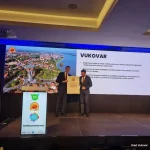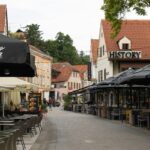Numerous Croatian cities of all different sizes and in various locations across the country have been proclaimed ”the best” in their respective areas, and the winners were announced at a popular hotel in Šibenik.
As Novac/Vedran Marjanovic writes on the 4th of October, 2019, Zagreb’s triumph was being chosen as the best big city in terms of quality of life, Pula was proclaimed the best big city in terms of economy, and individual awards went to to Koprivnica for ECO City and Dubrovnik for Smart City.
These are the most anticipated decisions in this year’s selection for the ”Best Cities”, organised by Jutarnji list, Gradonacelnik.hr and the Ipsos agency, which ended with the finals at the Amadria Hotel in Šibenik as part of the Regional Development and EU Funds Day organised by the Ministry of Regional Development and EU Funds.
In addition to Zagreb, Poreč (in the competition of medium-sized cities) and Krk (in the competition of small towns) both won the titles of the best in the quality of life category. Poreč thus defended the title of the best that it also took home last year.
In the category of education, demography, youth and social policy, Pazin (big city), Labin (middle-sized city) and Cres (small city) were all named as winners.
Awards to the best cities for the withdrawing of money from EU funds went to Zadar (big city), Križevci (medium city) and Ludbreg (small city). For the second year in a row, Križevci received the award for being the best city in terms of the withdrawal of EU funds, with the difference being that only one Croatian city received this award last year, and this year, three managed to win.
Koprivnica won the title of ECO City for the best solutions in waste management and environmental protection, with its competition having been the other continental Croatian cities of Ludbreg, Čakovec, Belišće and Jastrebarsko, which won last year in this category.
In the competition for the Smart City award for the best practices and solutions in the application of smart technologies, Dubrovnik triumphed, and its competition was Rijeka, Varaždin, Bjelovar and Jastrebarsko.
Zagreb won the title of Best in the competition for quality of life in big cities, with its competition having been Samobor, Čakovec, Varazdin and Dubrovnik. Zagreb is “number one” among large Croatian cities, by, among other factors, the average per capita income (which stands at 44,733 kuna) and by the number of highly educated people living there.
The Croatian capital is therefore among the top three big Croatian cities by the criteria of original budget revenues, the gross wages of employees, the share of tax revenues in the budget, and the share of subsidies for urban transport in the city budget.
The evaluation of Croatian cities in terms of the quality of life was conducted by an expert jury and done so according to nine criteria. The criteria saw city budgets analysed, and several things were taken into account, they included budgetary allocations for environmental protection, sport, culture, and waste management. As part of this research, a survey was conducted among residents about the quality of life in their respective communities.
Pula was crowned as this year’s winner of the selection of the largest cities when it comes to the economy. In the final competition with Pula in this category were last year’s winner – Varaždin, as well as Rijeka, Samobor and Dubrovnik.
Pazin managed to secure the title of winner in the category of large cities in terms of education and demography thanks to the amount allocated from the city budget for education, social policy and the city’s youth – as much as 58 percent of it.
Make sure to follow our dedicated lifestyle page for more information about life in various Croatian cities and much, much more.









